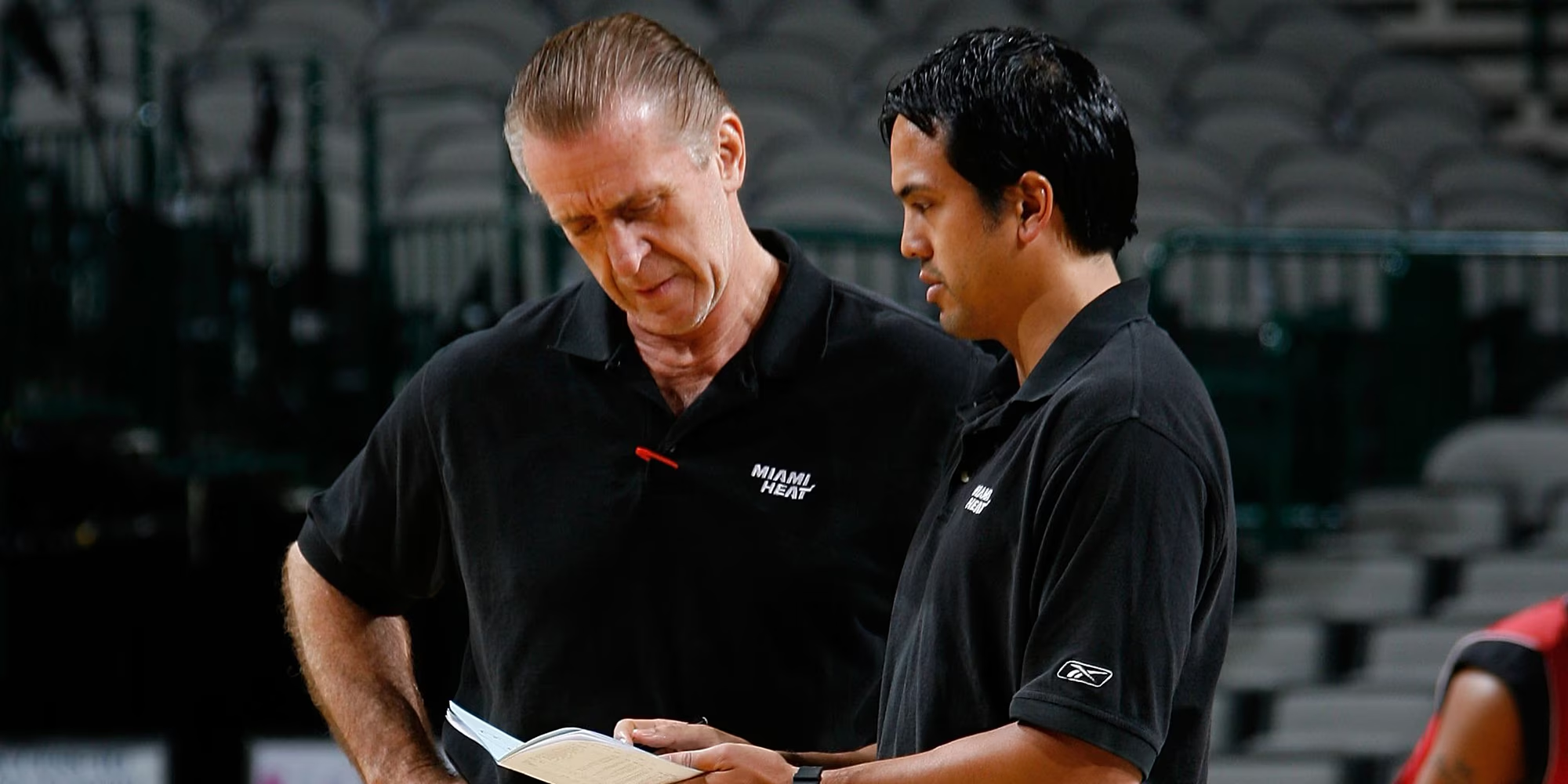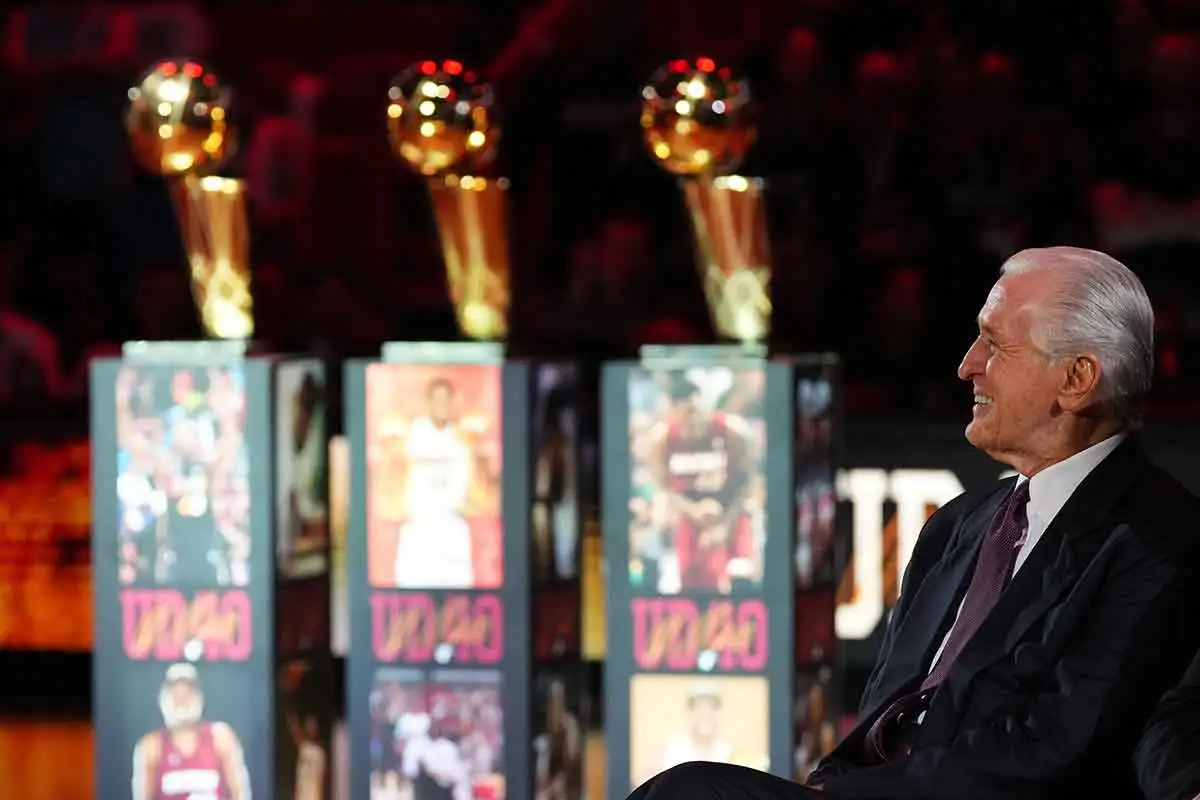Pat Riley’s impact on the Miami Heat franchise cannot be overstated, given the immense
success he’s brought to the team. He has played a pivotal role in all three championship runs
and continues to build a contender year after year. Unlike other NBA teams that have opted to
tank, Riley remains committed to constructing a roster that competes every night, embodying
what we Heat fans proudly refer to as “Heat Culture.”
Recently, Riley was honored by the franchise when the home court was named “Pat Riley
Court” in celebration of his 30th season with the organization and in recognition of the profound
impact he has had on basketball in the city of Miami. Riley first arrived in 1995, when he was
named both head coach and president of basketball operations. Essentially handed the keys to
the franchise, Riley was entrusted with bringing success to a young expansion team that had
struggled with mediocrity since its introduction in the 1988-1989 season.
Riley quickly made moves, trading for stars like Alonzo Mourning and Tim Hardaway, and
soon enough, the Heat began making playoff runs and earning respect in the Eastern
Conference. In his second year coaching the team, the Heat posted an impressive 61-21 record
and reached the Eastern Conference Finals, only to lose to what many consider the best team
in the league at the time—the Chicago Bulls, led by Michael Jordan, who went on to win it all
that year.
Although this first iteration of a competitive group never made a Finals appearance, they played
hard-nosed basketball and carried a sense of pride that reflected Riley’s coaching philosophy.
This approach laid the foundation for the Heat Culture that would later define the team’s
sustained success.

After several years without winning it all, Riley decided to step aside as head coach, handing
the reins to Stan Van Gundy. That same year, the Heat drafted a player who would soon
become a franchise icon: Dwyane Wade. Wade quickly showed his potential, prompting the
organization to accelerate its championship timeline by acquiring superstar big man Shaquille
O’Neal in the summer of 2004. Twelve games into the 2005-2006 season, Van Gundy resigned
as head coach due to “personal reasons,” and Riley once again took over the role.
Under Riley’s leadership, alongside “Flash” (Wade) and the original “Superman” (sorry,
Dwight Howard), the Heat posted a 52-30 regular-season record and ultimately overcame Dirk
Nowitzki and the Dallas Mavericks in the 2006 Finals to secure Miami’s first-ever
championship. It was the culmination of Riley’s mission, which began when he first took the
reins of the franchise in 1995.
After a brief period of diminished success, Riley handed the role of head coach to Erik
Spoelstra, who many consider to be the best coach in basketball today. That move came with
significant uncertainty, as Spoelstra had never been a head coach at the NBA level. However,
Riley had full faith in Spoelstra, and his confidence was proven right after many successful
years. There was a high level of scrutiny surrounding that decision, given Spoelstra’s status as
an unknown commodity. After a few years of gaining experience and acclimating to the daily
grind of the NBA, Riley played a pivotal role in constructing a superteam better known as the
Big 3, with All-Stars LeBron James and Chris Bosh joining Dwyane Wade in South Beach,
and the pressure was finally on.

This team faced intense scrutiny from the national media, as bringing three future Hall of
Famers in their prime together on one roster was an unprecedented move in the league. While
the Boston Celtics had previously constructed their own version of a Big 3, the magnitude and
impact of this Miami Heat group were clearly unparalleled. After a tough showing in the 2011
Finals, this group returned with some roster adjustments and overcame a young Oklahoma
City Thunder team in the 2012 Finals. They may have won in five games, but all those games
were incredibly competitive and no small task.
Let’s not forget the following year, when they faced the formidable San Antonio Spurs, a force
to be reckoned with. Down 3-2 in the series, Ray Allen made what many consider the greatest
shot in NBA history—a corner three-pointer to send Game 6 into overtime. The Heat went on to
win that game and eventually secured victory in Game 7, solidifying their status as back-to-back
champions. This triumph was the fulfillment of Riley’s vision, which began when he first took the
reins of the franchise in 1995.
The Heat will forever be remembered in the record books for their impressive accolades,
including the 27-game win streak, which will always hold a special place in my heart as a fan.
Unfortunately, the Heat haven’t made it over the hump since the 2013 season, but the team has
continued to overcome numerous obstacles, reaching the Finals three times since that
championship run and remaining one of the most competitive groups in the league today.
The culture that Pat Riley has instilled in this franchise continues to shine through, regardless of
expectations. Recently, I’ve seen the Heat embrace the underdog role, whether or not it
accurately reflects their situation, using it as motivation—an attitude undoubtedly stemming from
Riley’s unwavering belief in hard work and determination. Though these last couple of seasons
haven’t resulted in a championship, Riley still believes this core has what it takes to reach the
mountaintop. Who am I to doubt the man?
In the “Godfather” (as my grandma likes to call him, just like many other figures in the NBA do),
we trust. Thank you, Pat, for many years of success; we know the job isn’t finished as we strive
for more championships and continue to uphold the legacy of Heat Culture in your honor.


